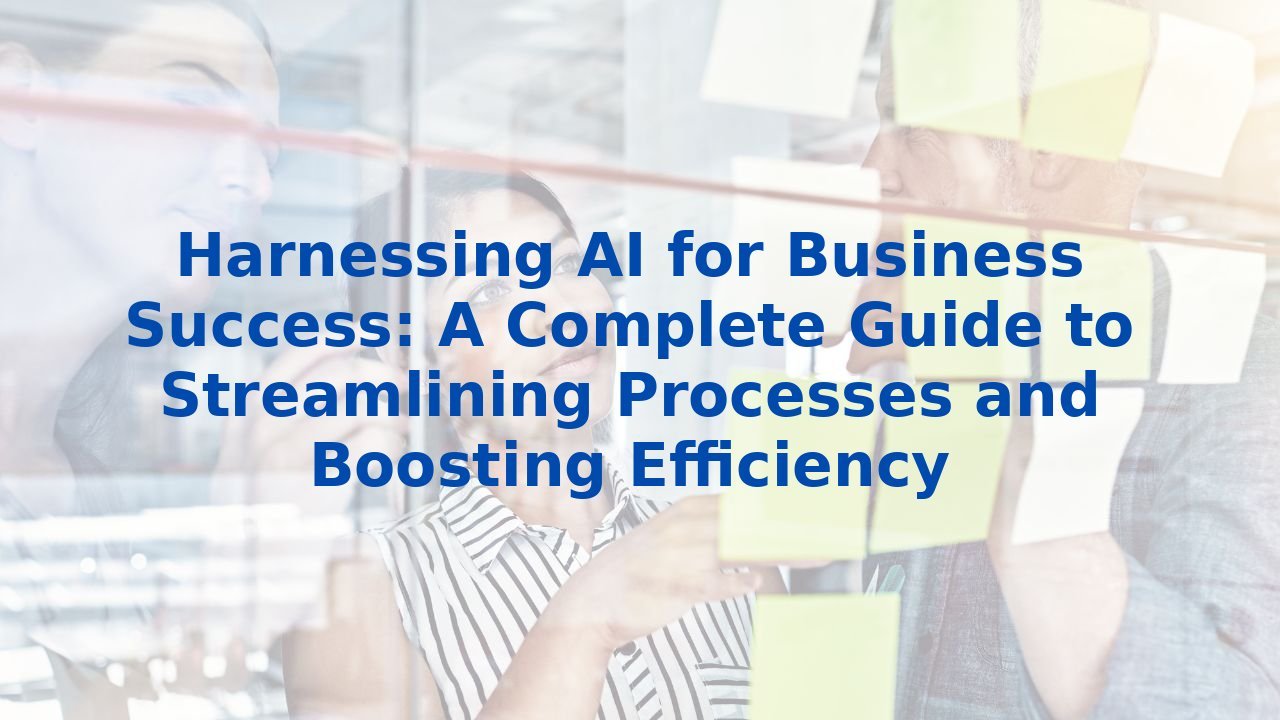Harnessing AI for Business Success: A Complete Guide to Streamlining Processes and Boosting Efficiency
Harnessing AI for Business Success: A Complete Guide to Streamlining Processes and Boosting Efficiency
In today’s fast-paced business landscape, the pursuit of efficiency and optimization is non-negotiable. Artificial Intelligence (AI) has risen to the forefront as a transformative force that can help organizations streamline processes, enhance productivity, and ultimately drive profitability. This guide explores how AI can revolutionize various business processes and the vital role of employee training in maximizing these benefits.
The Role of AI in Business Process Management
AI in business process management involves utilizing advanced AI capabilities to design, analyze, automate, and refine processes and workflows. This strategic adoption enables organizations to not only improve their operational efficiency but also cultivate a streamlined workflow that propels growth.
Data Analysis
One of the core strengths of AI is its ability to dramatically accelerate data analysis. By organizing and interpreting vast datasets with remarkable speed, AI empowers businesses to make informed, strategic decisions. AI can reveal crucial trends, predict outcomes, and pinpoint root causes—all while automating manual data-related tasks. As a result, organizations can transform data from a mere byproduct into a strategic asset that informs every aspect of their operations.
Process Building
AI excels in the arena of process building. Organizations can leverage AI to create new workflows and processes tailored to their specific needs. This level of automation significantly reduces the time and energy required to establish processes, freeing up valuable resources for more strategic activities. By allowing AI to handle the heavy lifting, businesses can redirect their focus toward innovation and growth.
Automation
One of the most visible impacts of AI in business is the automation of repetitive tasks. From scheduling appointments to generating reports, AI can shoulder the load of mundane activities that typically bog down employees. Imagine a scenario where voice assistants schedule meetings and AI tools capture key highlights from conversations. This shift not only saves time but also allows employees to concentrate on higher-value tasks, thereby enhancing overall productivity.
Examples of AI in Business Processes
The applications of AI span various sectors and functions, each illustrating its transformative potential:
Sales and Marketing: AI optimizes sales strategies by managing inventory, predicting customer demand, and targeting the right audience through tailored ads. AI-driven CRM systems can even forecast potential revenue from different customers, enabling sales teams to focus their efforts strategically.
Manufacturing: In manufacturing, AI employs machine learning algorithms to analyze data for optimizing production. This includes predicting equipment failures and enhancing supply chain operations, leading to reduced costs and improved reliability.
Human Resources: AI aids HR professionals by enhancing objectivity in hiring, improving employee experiences, and swiftly addressing complex inquiries. By synthesizing data points, AI can help determine competitive salary offers, streamlining recruitment processes.
Security: Advanced AI techniques play a crucial role in safeguarding business operations. Deep learning methods enhance security measures by ensuring that financial transactions and sensitive data remain protected from growing cyber threats.
Future Applications of AI in Business
As technology continues to advance, the future applications of AI in business are vast and promising. With developments in natural language processing and computer vision, companies are exploring innovative solutions that integrate AI into everyday business operations. Real-time data analytics and process simulations are just a glimpse into the future of business efficiency—unlocking potential that was once considered beyond reach.
The Importance of Training Employees for AI
While AI automates tasks and enhances processes, the human element remains indispensable. Training employees to work alongside AI systems is critical. When equipped with skills in data analysis, decision-making, and process optimization, employees can effectively harness AI tools. This ensures that the organization maximizes AI’s benefits, leading to exponential growth and sustainable success. Comprehensive training programs provide the foundation that enables teams to adapt to evolving technologies and transform them into competitive advantages.
Conclusion
The integration of AI into business processes represents a monumental shift in how organizations operate. By focusing on data analysis, process building, and automation, businesses can streamline operations and elevate strategic initiatives. Additionally, empowering employees through robust training ensures that the full potential of these advanced technologies is realized. In this era of digital transformation, embracing AI is not just about enhancing efficiency—it's about fostering a culture of growth and innovation that can redefine business success.
By taking the necessary steps to incorporate AI into your processes and training your teams effectively, you position your organization to thrive in an ever-changing landscape. Now is the time to explore how AI can elevate every facet of your operations and bring your vision to life.



